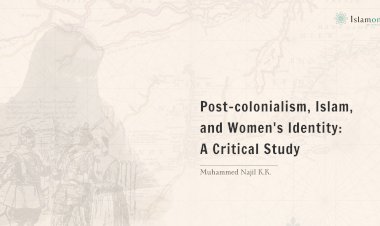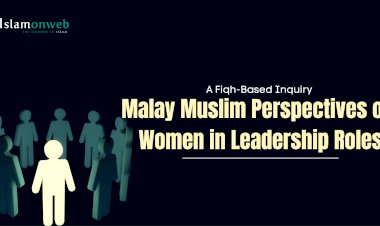Shared Duties in a Muslim House: Exploring the Concept of al-Qiwāmah
Allah said in Quran ﴾ٱلرِّجَالُ قَوَّٰمُونَ عَلَى ٱلنِّسَآءِ بِمَا فَضَّلَ ٱللَّهُ بَعۡضَهُمۡ عَلَىٰ بَعۡض﴿ which means “Men shall take full care of women with the bounties which God has bestowed more abundantly on the former than on the latter”. Based on this verse, the article discusses three major areas:
- Men’s Role in al-Qiwāmah
- Women’s Role in the full swing functioning of al-Qiwāmah
- Shared roles in Al-Qiwāmah
Men’s Role in Al-Qiwāmah
- Care and protection
Women require men to protect them and men also require women as source of rest and peace. Men and women need each other in a relationship and they have complimentary relationship.
Men have the ultimate responsibility to provide protection and care for their families. However, this protection and care are both external and internal. So, this protection and care will keep their family away from the causes of bad things and sins, and it will also keep them away from the things that will destroy religion and morality.
- Nafaqah
Nafaqah (financial support) is the duty of men. This is one of the responsibilities of men toward women. In the Quran, Allah says
فَقُلۡنَا يَٰٓـَٔادَمُ إِنَّ هَٰذَا عَدُوَّلَّك َوَلِزَوۡجِكَ فَلَايُخۡرِجَنَّكُمَا مِنَ ٱلۡجَنَّةِفَتَشۡقَىٰٓ
In Surah Taha, verse 118, Allah does not say that both of them will suffer; Allah only says that men, not women, will suffer after saying both men and women must come out of heaven. So, this verse, when we dig into its intrinsic facts, shows that men are responsible for nafaqah for their families.
Now the question is, "is it possible for women to help their husbands by giving nafaqah for their family?" For the answer to this question, we can see that Saidatina Khadijah helped Prophet Muhammad ﷺ with her financial support business because she is a businesswoman. If it is done with mutual understanding and recognising the status of the husband, then the adverse effect will not be there. But if it is otherwise, it will be destructive to the family and will cause harm to the balanced rhythm of the family.
- Discussion and Consultation
Allah said in Quran about discussion and consultation which is in Surah al-Baqarah verse 233:
فَإِنۡ أَرَادَا فِصَالًا عَن تَرَاض مِّنۡهُمَا وَتَشَاوُر فَلَاجُنَاحَ عَلَيۡهِمَاۗ
This means “if they both desire to wean through mutual consent from both of them and consultation, there is no blame upon either of them”. In this verse, Allah said about the discussion in the context of stopping the breastfeeding of a baby.
We have always heard about the right to speak for women and the freedom to speak in this era. So, men should apply this right in their family first, which is by encouraging a culture of discussion between husband and wife and giving women a chance to share their ideas in the management of the house.
Besides discussions between husband and wife about the family, they can also discuss their future plans with their children. This will benefit children in terms of developing their skills and expanding their ideas, as well as strengthening their relationships. Children can also share their views regarding matters like education and ambitions. In this way, they can develop an atmosphere of mutual understanding in the family.
Women’s Role in the Functioning of Al-Qiwāmah
- Good character
In Quran, Allah said: ﴾فَٱلصَّٰلِحَٰتُ قَٰنِتَٰتٌ حَٰفِظَٰت لِّلۡغَيۡبِ﴿ and this is the discussion of this verse in Surah al-Nisa’ verse 34.
- Goodness (ṣalāḥ): The first attitude is goodness. Good women are the ones who are firm in their faith, dutiful to their marital responsibilities, having good morals, and fulfilling the rights and duties that make them responsible to Allah.
- Obedience (al-qunūt): Obedient to the husband’s demands in all good matters. Obeying husband is part of her duty. This obedience should be wilfully and with a full heart.
- Guarding the intimacy which God has [ordained to be] guarded (حفظ الغيب): Protect the intimacy of the relationship between spouses by preserving the secrets between them and what happens in their lives. She does not carry out this preserving as a purely family duty but rather as a devotional aspect by which she draws closer to Allah.
Obedience
Wife needs to obey her husband while fulfilling his right. Some hadiths show the obligation of obedient women to their husbands. For example,
((الْمَرْأَةُ إِذَا صَلَّتْ خَمْسَهَا وَصَامَتْ شَهْرَهَا وَأَحْصَنَتْ فَرْجَهَا وَأَطَاعَتْ بَعْلَهَا فَلْتَدْخُلْ مِنْ أَيِّ أَبْوَابِ الْجَنَّةِ شَاءَتْ)) رَوَاهُ أَبُو نعيم فِي الْحِلْية
When a woman observes the five times of prayer, fasts during Ramadan, preserves her chastity, and obeys her husband, she may enter by any of the gates of paradise she wishes. We have to remember that this obedience is only in legally valid matters, not in sins.
Home Making
Rasulullah saw said that “the woman is a guardian and is responsible for her husband's house and his offspring”. She is the ‘home minister’ to run the family in a sound shape with better governance.
Shared roles in Al-Qiwāmah
- Honourable Mutual Treatment
Allah said in Surah al-Nisa, verse 9 ﴾وعَاشِرُوهُنَّ بِٱلۡمَعۡرُوفِۚ﴿ i.e., “live with them in kindness and honour”. Honourable mutual treatment is achieved in many ways, such as not frowning, showing a pleasant face, understanding, and using good words. Abusive words and deeds are prohibited in the familial atmosphere.
- Promotion of Virtue and Prevention of Vice
Allah said in Quran
كُنتُمۡ خَيۡرَ أُمَّةٍ أُخۡرِجَتۡ لِلنَّاسِ تَأۡمُرُونَ بِٱلۡمَعۡرُوفِ وَتَنۡهَوۡنَ عَنِ ٱلۡمُنكَرِ وَتُؤۡمِنُونَ بِٱللَّهِۗ
“You are the best nation produced as an example for mankind. You enjoin what is right and forbid what is wrong and believe in Allah.” Family is the fundamental unit of society. When we practice this promotion of virtue and prevention of vice in our family, then it will make society. Rasulullah ﷺsaid:
"The parable of the one who upholds Allah's laws and the one who breaches them, is that of a people who drew lots on a ship at sea. Some of them got the upper part, and some of them the lower part. Those on the lower part ascended to get water, spilling it upon those upper part. So those in the upper part say: 'We will not leave you to come up here and bother us.' Then those on the lower part say: 'We should make a hole in the lower part, so we can get water.' If they take them by the hand and stop them, then they will save all of them, and if they leave them, they will all drown."
The example in the hadith applies to many aspects of life, including the family. Promotion of virtue and prevention of vice is one of the means of ensuring family stability, safety, and continuity and achieving the great goal of maqasid shariah related to the Muslim family.
- Teaching
Rasulullah ﷺsaid in a hadith
عَلِّمُوا أَوْلادَكُمُ الْقُرْآنَ فَإِنَّهُ أَوَّلُ مَا يَنْبَغِي أَنْ يُتَعَلَّمَ مِنْ عِلْمِ اللَّهِ هُوَ. رواه جابر بن زيد الأزدي
“You should teach your children the Quran, which is the first thing that should be learned from knowledge”. Parents are the first institution where from the children learn the basic lessons of life. They have to be role models. In addition, they should provide formal education for their children.
Sum up
If the family runs as explained above, it will give the fruits of love, happiness and virtues in the Muslim house.
Major Reference:
Prof Arif Ali Arif and Nafi’ bin Zahran Rawahi, al-Jawanib al-Amaliyyah li al-Qiwamah al-Shar’iyyah, Majallah al-Lughah al-Arabiyyah li al-Bahth al-Ikhtisasi, 2015.
About author:
Muhammad bin Rosli is Degree Student, Department of Fiqh and Usul al-Fiqh, International Islamic University Malaysia
Disclaimer
The views expressed in this article are the author’s own and do not necessarily mirror Islamonweb’s editorial stance.
























Leave A Comment